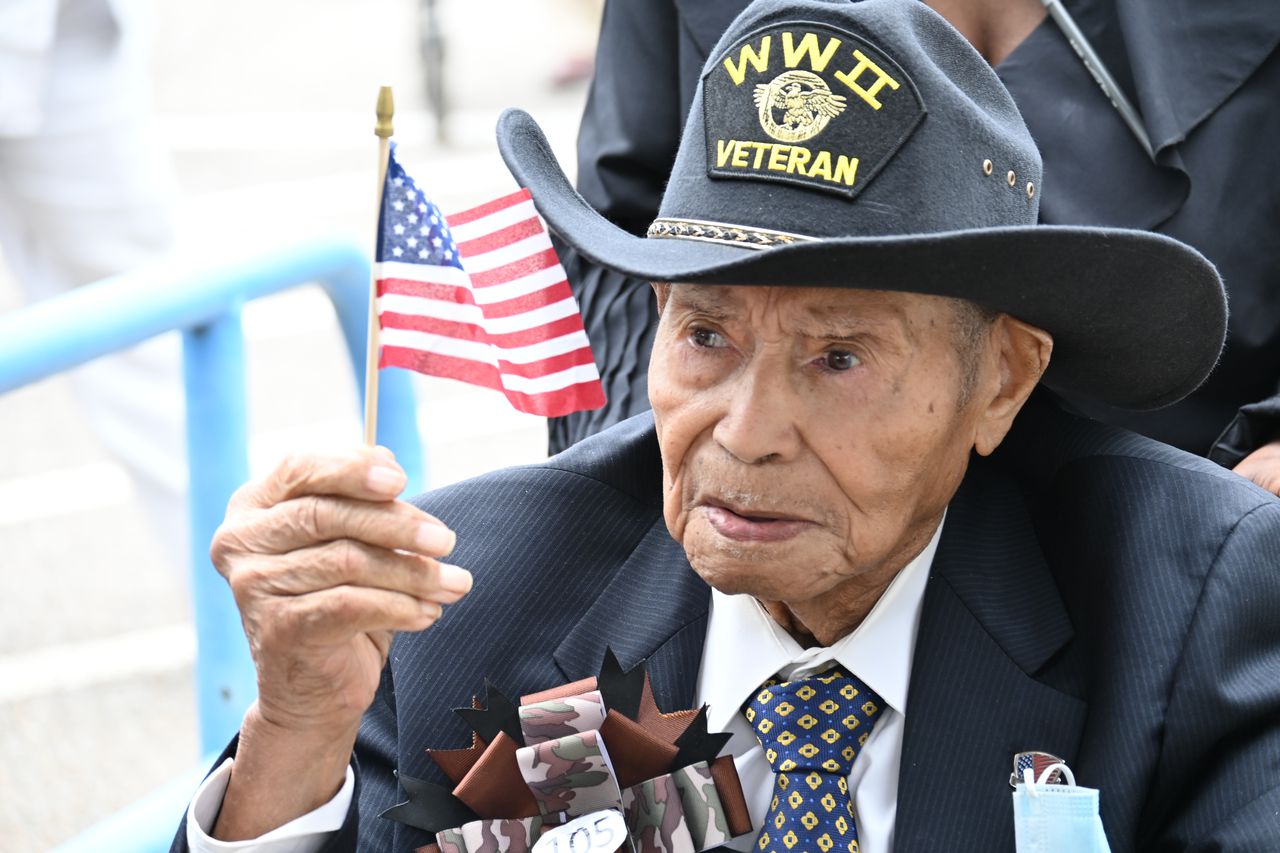Alabama native celebrated on 105th birthday
Taylor Howard’s goals of “freedom and equality” have remained through a long life that took him to the front lines of the battlefields during World War II to inside a movie theater he helped build and was used as a gathering place during the civil rights movement.
It’s also a life that brought him back to his native Alabama where he lives in Mobile under care at a medical foster home for U.S. Veterans.
Inside a Mobile senior center on Friday, friends and family gathered to celebrate Howard on his 105th birthday.
“He’s always been a fighter for justice and equality and believes that all races should work together,” said Sandra Howard Adams, 65, of Gulfport, one of Howard’s five children.
Howard, believed to be the oldest surviving veteran in Mobile County, was recognized by the City of Mobile and the South Alabama Veterans Council during a brief program that featured music, lunch, cake, balloons and a family gathering.
“I prayed that the good Lord would keep my dad to September 13, 2023,” said daughter Lettie Howard Alexander, 69, of Slidell, La. “His grandfather, also named Taylor Howard, lived to 105. He was also from Alabama. I was grateful that when this morning came, I woke up … and the good Lord answered our prayers.”
She added, “He was a good father, and guided us in loving everyone.”
Buffalo solider
Howard’s biography is one that began on a farm in Choctaw County, where he grew up as one of 10 children. He worked with the Progress Administration, a federally sponsored program that employed Americans during the Great Depression before joining the Civilian Conservation Corp in 1937.
Howard was drafted into the U.S. Army and served in the all-Black 92nd Infantry during the height of World War II. Known as “buffalo soldiers,” in reference to 19th-century Black cavalrymen, the 92nd Infantry Division was a segregated unit that, during the Italian campaign of World War II, were among a handful of Black units to serve in combat.
Howard served in Germany, France and Belgium as a rifleman and sharpshooter.
“He saw a lot of action during the Second World War,” said Lou Lartigue, president of the South Alabama Veterans Council.
Howard is among the last surviving soldiers of World War II. Of the approximately 70 million people who fought in the war between 1939-1945, as of September, there are about 119,550 living in the U.S. That’s less than 1 percent, and about 131 are dying per day due to old age, according to the National World War II Museum in New Orleans.
“We want him around, to have him come to our meetings,” Lartigue said. “We are running out of Worl War II veterans.”
Civil rights advocate
After the war, Howard returned to Mississippi where he lived most of his adult life in Gulfport and where he became a civil rights and community advocate, attending political rallies.
As a board member of the Community Action Program (CAP), he met with lawmakers in Washington, D.C., and was instrumental in bringing the Head Start program to the Mississippi Gulf Coast. Howard was also credited with establishing one of the first Neighborhood Watch programs to Gulfport.
Howard attended trade school and learned “all he could about building and construction, never underestimating the importance of math and solving equations,” according to a 2017 resolution honoring him in the Mississippi Legislature.
He became an apprentice in his brother’s construction business. He eventually formed his own business, partnering with his brother, and building churches and homes throughout the Gulf Coast.
But it was involvement in building a movie theater that elevates Howard’s story as a civil rights advocate.
“At that time, of course, segregation did not allow our community to go to the movie theater,” said Adams. “He wanted the children to have that right. He built a theater from the ground up.”
In fact, he is credited with opening two movie theaters, both in Gulfport. Both theaters were named the “Embassy Theatre.”
“He did free shows in the summer where you could get in with six bottlecaps,” said Adams. “It was a place to give (Black) children the rights to eat popcorn and chili dogs and watch a movie like everyone else. Even today, the children he impacted still talk about how much that meant to them.”
Howard’s children worked at the theater during the 1950s and 60s, until both theaters closed in 1969, or a few years after the approval of the Civil Right’s Act of 1964 that outlawed segregation of businesses, schools and other places.
“When integration came, we were able to do more,” said Adams. “(The theaters) served their purpose at the time.”
She said the theaters also meant a lot more than showing movies for Black Mississippians. They were also a gathering place during for civil rights leaders.
“There was a bomb threat there once, and the FBI had to clear everyone out,” Adams said.
‘Loving man’
Howard has been described as a mentor, nurturer, protector, and leader who was an active member of a Baptist Church in Gulfport for more than 85 years.
“We went to church, Sunday school all the time and to all the programs that were going on in the 50s and 60s,” said Alexander, his oldest daughter. “We lived an old-fashion way – obedient to parents, and good and kind to everyone.”
Howard speaks softly and with some assistance but advised people on Friday to “try and make peace with everyone … throughout the world.”
Anthony Spears, 75, of Biloxi, said his father was simply a “loving man.”
“He always wanted everyone to show love to each other and the community itself,” Spears said.
